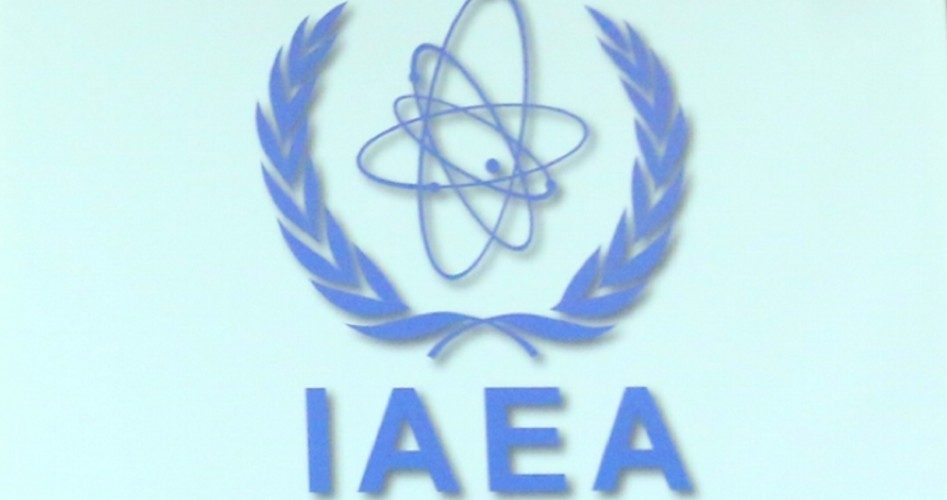
The International Atomic Energy Agency (IAEA), which has investigated for years whether Iran was working secretly to develop a nuclear weapons capability, decided Tuesday to end its investigation and to support instead the deal that Tehran struck in July with several other governments, including the U.S. government.
A Reuters report on the decision, which was made by a vote of the UN agency’s 35-member board, summarized the IAEA’s findings after 12 years of investigation: “The IAEA produced a report this month that strongly suggested Iran engaged in coordinated activities aimed at developing a nuclear bomb up until 2003, though it found no credible sign of weapons-related work beyond 2009.”
Reuters called the IAEA decision “a symbolic victory for Iran,” which has denied on multiple occasions that it had a nuclear weapons program.
The IAEA has promised to continue monitoring Iran’s compliance with the agreement reached with the United States, Russia, Germany, China, France, and the United Kingdom, which states that economic sanctions on Iran will be lifted if the Iranian government promises to accept restrictions on its production of nuclear weapons.
Iran’s ambassador to the IAEA, Reza Najafi, expressed intense satisfaction with the decision, predicting that it “will open a new chapter for cooperation between Iran and the agency.” Najafi promised that Iran intends to “complete this process within two to three weeks,” and that the nuclear restrictions will be in place before the parliamentary election in February.
IAEA Director-General Yukiya Amano stated it would take weeks to verify that Iran has met its part of the agreement, including the reduction of its enriched-uranium stockpile and the removal of the centrifuges that purify uranium. Only then will all the international sanctions against Iran be removed.
Those supporting the deal contend that the IAEA is given greater powers to inspect Iran’s nuclear facilities, thus causing a longer delay for Iran to develop atomic weapons, if it chooses to do so in the future.
Officials at the Institute for Science and International Security, however, did share the optimism of the deal’s supporters, insisting, “Iran’s cooperation was certainly not sufficient to close the overall PMD [Possible Military Dimensions] file.”
In the United States, the Iran nuclear deal has been a controversial political issue. Though President Obama proclaimed the deal to be a great victory for the United States, many Republicans and not a few Democrats disagreed.
Although the Constitution clearly states that any treaty negotiated by the president must have the approval of two thirds of the U.S. Senate, Senator Bob Corker (R-Tenn.) paved the way for yet another Obama victory over Congress and the Republicans when he won passage of the Corker-Menendez bill back in April. This legislation removed the necessity of the president obtaining the vote of two thirds of the Senate to gain treaty approval, creating a situation wherein he must have the support of only one third of each house of Congress.
This is because, thanks to Senator Corker and all congressmen who voted for his legislation (S. 615), the president would submit the measure (which Obama insists on calling an “executive agreement” rather than a treaty) to Congress, which could then vote a resolution of disapproval. If the measure failed to win two thirds of both houses of Congress, then Obama could simply veto the act of disapproval.
Regardless of what one thinks of the merits of the Iran deal, Congress has no authority under the Constitution to transfer any of its powers to the president. The Constitution requires, in Article II, Section 2, that the president “shall have power, by and with the advice and consent of the Senate, to make treaties, provided two thirds of the senators present concur.” Every member of Congress has taken an oath to follow the Constitution. Nothing is said in that document about allowing members of Congress to surrender any of their powers to the president.
Certainly, all Americans should hope that the nuclear agreement with Iran is in our national interest. While the Senate has shirked its duty to examine the agreement and either support or reject it, thus far the Iranian parliament has not agreed to the deal either. For that matter, the president of Iran has not even signed it. The State Department wrote Representative Mike Pompeo, a member of the House Intelligence Committee, telling him that the deal is not even an “executive agreement,” much less a treaty. It is not even a signed document. Its success will depend not on whether it is “legally binding,” but upon “extensive verification measures.”
So far, the prospects for success are not encouraging. Recently, the Iranians conducted a second test of a nuclear-capable ballistic missile forbidden in the unsigned deal.
As serious as the Iran deal is, in and of itself, another piece of this story which should be of concern to constitutionalists is the willing transfer of ever more power to the executive branch. “As commander-in-chief,” Obama declared in defense of his Iran deal, “I make no apology for keeping this country safe and secure through the hard work of diplomacy over the easy rush to war.” Former Secretary of State Hillary Clinton, who desires to live again at 1600 Pennsylvania Avenue and enjoy the awesome power of the presidency, echoed Obama’s comments back in March. Condemning the 47 senators who had written a letter to the Iranian mullahs promising to end the deal once Obama left office, Clinton declared, “Either these senators were trying to be helpful to the Iranians or harmful to the Commander-in-Chief in the midst of high-stakes international diplomacy.”
The use of the term “commander-in-chief” in reference to the president negotiating an agreement with a foreign nation demonstrates an utter disregard for the Constitution by Obama, Clinton, and others who make the same argument. The president is commander-in-chief only of the nation’s armed forces. The term does not apply to his role in negotiations with other countries. One must ask, just who do they believe the president is commanding when he makes these agreements — Congress? The Constitution in no way makes the president the commander of either Congress or the American people in general. Such a title would be more appropriate for a king.
Regardless of what one thinks of the deal regarding Iran’s nuclear program, the larger issue should concern all those who believe in the rule of law: namely, the escalating concentration of power in the executive branch of the federal government, in clear violation of the letter and the spirit of the Constitution.
Photo: AP Images
Steve Byas is a professor of history at Hillsdale Free Will Baptist College in Moore, Oklahoma. His book, History’s Greatest Libels, is a challenge to the great lies of history.



